70% of an advisor’s new clients are in the middle of a major life change.
70%!
How does an advisor (and their wholesaling partners) best accommodate these clients, their emotions and their money?
Dr. Moira Somers is a clinical neuropsychologist, professor and financial recovery expert.
She is on faculty with the Sudden Money Institute, where she trains advisors on the psychological factors at play during major life transitions. Current projects include the development of a Transition Fatigue Questionnaire, and objective testing of financial planners’ interpersonal effectiveness. 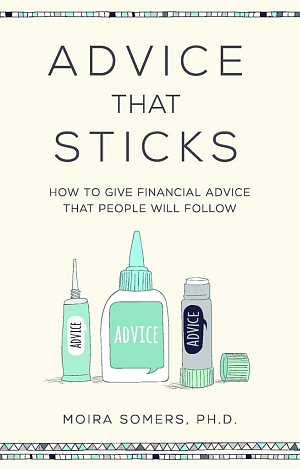
An expert in financial psychology, she trains financial professionals across North America to work more effectively with the whole spectrum of challenges their clients bring to them: erratic decisions, overwhelming stress, procrastination, family challenges, etc.
Check out Dr. Somers’ new book, Advice that Sticks: How to Give Financial Advice that People Will Follow.
To inquire about booking Dr. Moira Somers for your next event through Wholesaler Masterminds Speakers Bureau contact us at info@wholesalermasterminds.com
Planning an Advisor Roadshow? Let us help you extract a better ROI than you have ever experienced. Read about our Roadshow Plans.
Implementation Support is the Best Value-Add
A question for you wholesalers: Have you ever had the experience of giving great advice to somebody who seemed really receptive to it, only to then watch the advice go unimplemented?
Yeah, I thought so. Me, too. It makes me yearn to work with potted plants, some days. But somehow I am always drawn back to the challenge of working with people and their money, and of helping others do the same.
In my work as a professor, a financial industry consultant, and a wealth psychologist, I spend a great deal of my time digging deeply into a few key issues:
1. What makes it so hard for people to do the right things for their professional or personal well-being?
2. What can be done to help them make and sustain meaningful behavior change?
In this podcast, Rob Shore and I explored some of the answers that have been emerging from this work. Most of the interview focused on the phenomenon of Transition Fatigue, a state of mental depletion that can set in following major life changes such as divorce, death of a parent or spouse, or a business merger.
What are Transitions?
Transitions are life events that lead to major changes in people’s view of themselves. They move us from “I used to be…” to “But now I’m…”.
With that change in identity comes a whole lot of other things: big emotions, steep learning curves, major changes in social support networks. Most transition events also have very big financial implications attached to them (e.g. inheritances; insurance changes; pensions; etc.). As a result, this is the very time that clients are most likely to need sound financial counsel. What financial advisors quickly encounter, however, is the reality that such clients often do not have access to their best thinking.
They’re worn out; they’re overwhelmed; they dither; they make commitments and then don’t act upon them.
The demographics of the financial services profession are such that many advisors (and wholesalers, too) are going through major life transitions of their own, changes that are no different from those facing their clients.
As they hit late middle age, more and more advisors will be coping with ailing parents and truculent teens at the same time they’re trying to position their business for sale or transition. When your customers are going through such major life transitions, you can pretty much count on a higher-than-normal frequency of your calls going unreturned, or paperwork not getting filled out, or appointments getting cancelled with very little notice. This is Transition Fatigue, up close and personal.
It ain’t pretty.
How can you best be of service to folks who may be experiencing Transition Fatigue?
By thinking of every possible way that you can make your advice easier to implement – in short, by easing their load. Here are three things for you to keep top of mind:
- Remember that the default action (which usually means doing or changing nothing) reigns supreme. Every form that customers have to fill out, every click they have to make, every signature they need to provide is a hindrance to their work with you. Eliminate as many of these small steps as possible. With those steps that remain, offer to do as much of the legwork as you possibly can.
- Do you know the best predictor of getting through hard times? It’s social support. That can come in many forms – through offering up encouraging words, providing useful information, and using a variety of modalities for letting them know that you are thinking of them and have their back.
- Your contact list can be one of your most valuable resources for people undergoing major transitions. When they off-handedly mention their need to contact an attorney or a counsellor, for example, or when they express a wish to find safe housing for their elderly relative, your list of pre-vetted resources can feel like a godsend. This is the very thing that can move people from being stuck to gaining traction.
The financial industry marketplace is awash with suggestions for “value added” experiences and products. Once a customer takes delivery of these experiences and products, however, many of them just lie dead in the water. They create cognitive and/or physical clutter in the lives of busy professionals.
People experiencing Transition Fatigue yearn for clarity, not clutter. They want help in getting the most important tasks done, and they want to feel less stressed and alone in the process.
So here’s a radical idea for you: Think of implementation support as your ‘value add’.
It’s non-polluting and inexpensive. It doesn’t take up space or create clutter. It meets the highest compliance and fiduciary standards. It positions you as a caring, resourceful colleague who knows how to be helpful without being pushy. And it pays dividends in terms of customer retention and referrals.
Nice! Way nicer, I’ve found, than potted plants.
Written by Dr. Moira Somers


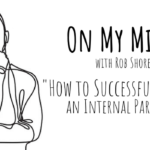 On My Mind: How to Successfully Share an Internal Partner
On My Mind: How to Successfully Share an Internal Partner Become a Crazy Good Speaker! with Deirdre Van Nest
Become a Crazy Good Speaker! with Deirdre Van Nest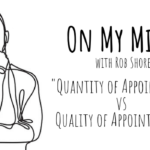 On My Mind: Quantity of Appointments vs Quality of Appointments
On My Mind: Quantity of Appointments vs Quality of Appointments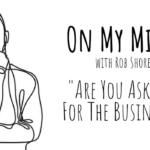 On My Mind: Are You Asking For The Business?
On My Mind: Are You Asking For The Business?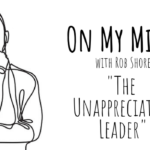 On My Mind: The Unappreciative Leader
On My Mind: The Unappreciative Leader